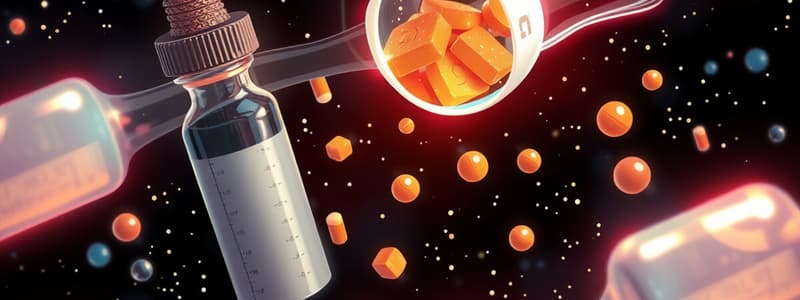Podcast
Questions and Answers
What are Central Nervous System (CNS) stimulants used for?
What are Central Nervous System (CNS) stimulants used for?
- Treat depression
- Treat ADHD (correct)
- Treat insomnia
- Treat obesity (correct)
What classification do drugs like heroin and fentanyl belong to?
What classification do drugs like heroin and fentanyl belong to?
Class A Drugs
What are examples of Class B drugs?
What are examples of Class B drugs?
Cocaine, LSD, PCP, Oxycodone, Ecstasy, Methamphetamines, Percocet, Dilaudid
What are some examples of Central Nervous System (CNS) depressants?
What are some examples of Central Nervous System (CNS) depressants?
Which of the following are examples of hallucinogens? (Select all that apply)
Which of the following are examples of hallucinogens? (Select all that apply)
CNS depressants can be addictive because they reduce ______.
CNS depressants can be addictive because they reduce ______.
What effects can CNS stimulants have?
What effects can CNS stimulants have?
What are common side effects of CNS depressants?
What are common side effects of CNS depressants?
Which of the following methods are used to ingest hallucinogens? (Select all that apply)
Which of the following methods are used to ingest hallucinogens? (Select all that apply)
What indicates chronic abuse or overdose for CNS depressants?
What indicates chronic abuse or overdose for CNS depressants?
What do Dissociative Anesthetics do to the brain's perception?
What do Dissociative Anesthetics do to the brain's perception?
What are common effects of hallucinogen use?
What are common effects of hallucinogen use?
Which of the following are possible signs of hallucinogen abuse? (Select all that apply)
Which of the following are possible signs of hallucinogen abuse? (Select all that apply)
Flashcards are hidden until you start studying
Study Notes
Central Nervous System (CNS) Stimulants
- Increase alertness, attention, energy, and confidence.
- Legally treat conditions such as obesity, sleep disorders, and ADHD.
Controlled Substance Classifications
- Include drugs that produce stimulant, depressant, or hallucinogenic effects on the CNS.
Class A Drugs
- Examples include heroin, GHB, Ketamine, Rohypnol, Fentanyl, and synthetic opioids.
Class B Drugs
- Includes cocaine, LSD, PCP, oxycodone, ecstasy, methamphetamines, Percocet, and Dilaudid.
Class C Drugs
- Comprises THC (Hashish), Klonopin, Valium, Vicodin, Xanax, and synthetic marijuana.
Class D Drugs
- Encompasses marijuana and Phenobarbital.
Class E Drugs
- Other prescription drugs not classified in A, B, C, or D, such as certain steroids.
Commonly Abused Controlled Substances
- Categories include CNS stimulants, CNS depressants, hallucinogens, dissociative anesthetics, inhalants, and cannabis.
Examples of CNS Stimulants
- Cocaine, Amphetamines, Methamphetamines, and Methylphenidate.
Factors Affecting Side Effects
- The intensity of side effects depends on dosage, method of ingestion, and time since ingestion.
CNS Stimulants Side Effects
- Symptoms can include nasal redness, runny nose, dry mouth, teeth grinding, tremors, increased alertness, rapid speech, sweating, paranoia, irritability, and aggressiveness.
Central Nervous System (CNS) Depressants
- Slow down brain and psychomotor activity, often used legally for epilepsy, anxiety, insomnia, and mental illness.
Examples of CNS Depressants
- GHB, Rohypnol, alprazolam, diazepam, and phenobarbital.
Common CNS Depressant Side Effects
- Include disorientation, confusion, drowsiness, uncoordinated movements, relaxed inhibitions, and slowed reflexes.
Addictiveness of CNS Depressants
- They can be addictive as they reduce mental stress and anxiety.
Signs of Chronic Abuse or Overdose
- Indicators include high body temperatures, shallow breathing, cold clammy skin, rapid weak pulse, and dilated pupils.
Hallucinogens
- Cause profound distortions in perception, euphoria, and heightened sensitivity, leading to altered sensory experiences.
Examples of Hallucinogens
- Include Peyote, psilocybin mushrooms, LSD, MDMA, and Khat.
Methods of Ingestion for Hallucinogens
- Can be consumed orally, applied transdermally, smoked, injected, or insufflated.
General Indicators of Hallucinogen Use
- Symptoms consist of hallucinations, paranoia, nausea, body tremors, sweating, dehydration, and headaches.
Signs of Hallucinogen Abuse and Overdose
- Include flashbacks, memory loss, violent behavior, long-term hallucinations, seizures, and suicidal tendencies.
Dissociative Anesthetics
- Distort the brain's perception from the body and elevate pain thresholds.
Examples of Dissociative Anesthetics
- Include PCP, ketamine, DXM, and various analogs.
Methods of Ingestion for Dissociative Anesthetics
- Administered orally, transdermally, smoked, injected, through eye drops, or insufflation.
Common Dissociative Anesthetic Side Effects
- Symptoms can include warmth to touch, blank stares, slurred speech, hallucinations, confusion, and violent behavior.
Signs of Dissociative Anesthetic Abuse and Overdose
- Indicators include prolonged coma, seizures, shallow breathing, and psychosis.
Narcotic Analgesics
- Primarily used to relieve chronic pain and induce euphoria.
Studying That Suits You
Use AI to generate personalized quizzes and flashcards to suit your learning preferences.



